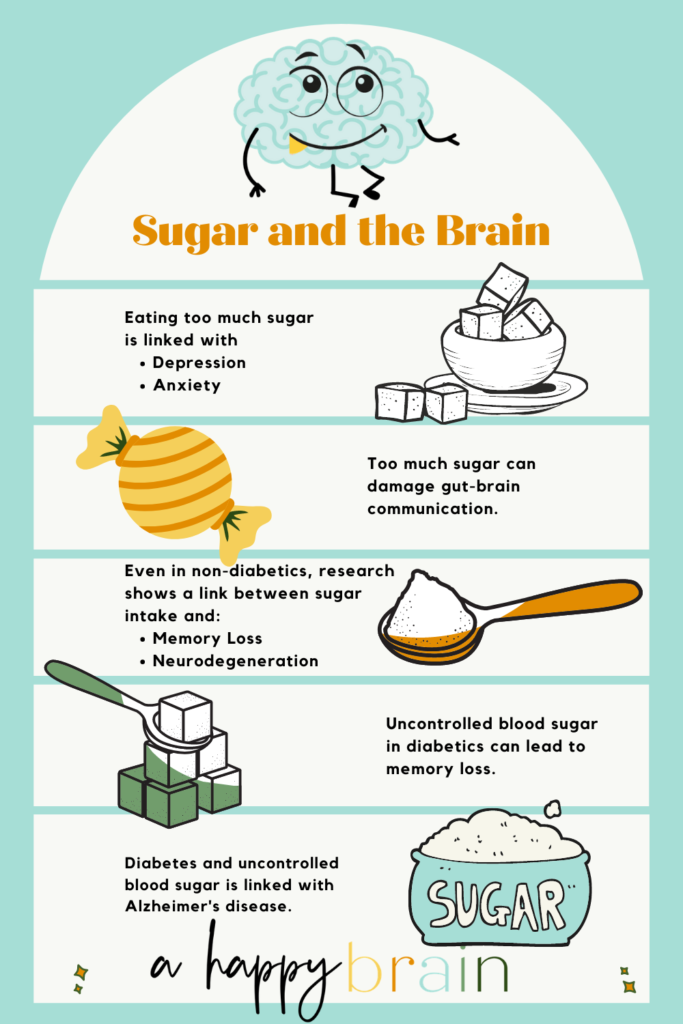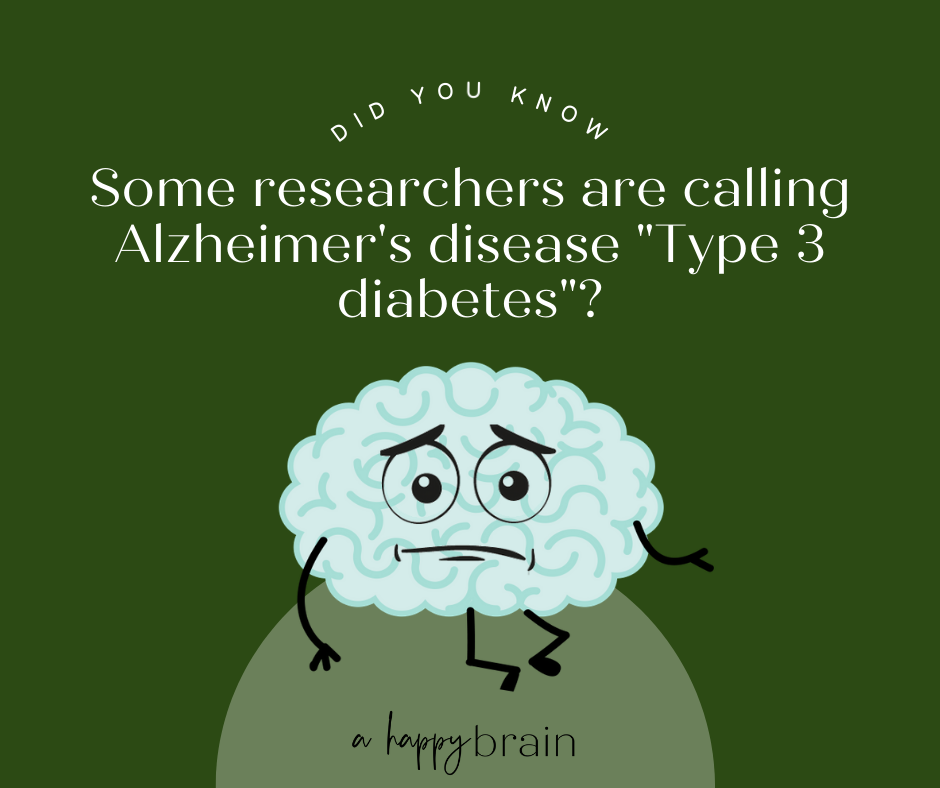Have you ever wandered about the link between eating sugar and brain health? In my recent post on the elements of our diet which are important to brain health, I touched on carbohydrates, and why they’re best kept to a minimum. Carbs are one of the three main ways the body gets energy. The other two are fats and protein, which we also dealt with in the last article (“fat’s where it’s at”, remember?!). Carbohydrates are made up of sugars, starches and some fiber. However, much of the carbohydrates in the Standard American Diet is various versions of sugar.
In this post, I’m going to zoom in on sugar specifically as the relationship between sugar and the brain merits its own article. Read on to learn all about how sugar affects the brain…
Pure Thinking Power
Our brain uses sugar as fuel. In fact, it uses one half of all the sugar energy in our body1, specifically one type of sugar—glucose. Because the brain is so packed with nerve cells (neurons), it requires a lot of fuel. If our glucose levels get low, our brain is unable to run at its best. Our memory, focus, and mood are quickly affected.
That doesn’t mean that eating more sugar is even better for your brain. In fact, quite the opposite is true.
For example, too much glucose, and other types of sugar such as fructose, has been found to have a negative affect on our brain health, In fact, there are links to memory and cognitive problems, and even “reduced brain volume”2. “Reduced brain volume” is a fancy way of saying that eating too much sugar makes your brain shrink. I, for one, would prefer my brain to be as voluminous as possible!
In a future article, we’ll discuss an alternative fuel for your brain that’s like jet fuel compared to the regular fuel that glucose provides.

An Overly Sweet Tooth–Sugar and Brain Health
Modern humans consume too much sugar. Here in the US, we eat triple the amount of the recommended daily sugar allowance. As always, the old mantra “everything in moderation” would serve us well, if only we could obey it! Then again, I’m not sure that refined sugar has positive effects in even a “moderate” amount.
The ancient part of our brain is programmed to crave sugar. Throughout our history, humans haven’t had easy access to sources of sugar. Our ancestors consumed their sugars through vegetables and (if they were lucky) fruit. This helped them increase their stores of fat so they could make it through times when food was less available.
While our ancestors didn’t have easy access to sugar in any form, now refined sugar is widely available. The proliferation of cheap, mass-produced sugar, combined with our ancient sugar cravings has caused our consumption has gone through the roof.
Unlike our ancestors, for most of us, the leaner times never come.
Our bodies haven’t had time to reprogram, so the cravings remain, despite the serious negative health impact of this vast over-consumption of sugar. This modern health crisis affects all aspects of our wellbeing, including the health of our brains.
Diabetes and Brain Health
When discussing the effects of sugar on the body, diabetes must be looked at first and foremost.
Those who suffer from diabetes are most at risk from suffering cognitive issues due to incorrect amounts of sugars getting to the brain3.
Both type 1 and type 2 diabetes are implicated in causing problems for the brain. Insulin is the hormone that tells your cells to take in the glucose in your blood stream. In type 1 diabetes, the immune system destroys your insulin producing cells and this insulin must be replaced with insulin injections. In type 2 diabetes, the cells don’t listen to the message from insulin.
Both type 1 and type 2 diabetes can cause your brain to experience large spikes and dips in glucose levels, and this can cause cognitive problems in the long run. This is why diabetes is closely associated with Alzheimer’s disease, and there is considerable research4 to show that they are medically intertwined. In fact, some researchers are starting to call Alzheimer’s disease “Type 3 diabetes”5, as it has become apparent that Alzheimer’s has a lot to do with insulin signalling and how the body deals with glucose.
The good news is that by correctly managing your diabetes, and controlling your sugar intake these cognitive effects can be avoided6.

Sugar Affects your Mood
Ever see a kid on a sugar high?! Your sugar levels can severely affect your mood, both in the long and short term. Unfortunately, the long term impact doesn’t feel as good as the short term high.
When we eat sugar, it activates our opioid receptors and cause our bodies to release dopamine. Dopamine is that “feel good” hormone that gives you a natural “high”. This makes you want to repeat the behavior. This is what makes us crave sugar-laden treats and makes it hard to stop eating them even though we know we should.
While eating sugar may make you temporarily feel good, mounting evidence links over-consumption of sugar with mood disorders and poor mental health7. These mood disorders include depression and anxiety.
A study by the British Journal of Psychology8 looked at the connection between diet and depression. They found that those who consumed a large amount of processed foods (like sweetened desserts, chocolates, and refined grains) suffered notably higher rates of depression.
The ‘Gut-Brain Axis’
Sugar and brain health also has some links to the impact sugar has on the microbiome of the gut. As I discussed in a previous article, gut health and brain health go hand in hand. What’s known as the “gut-brain axis”9 describes how the two organs are connected physically and biochemically. So naturally, our sugar intake, which is processed by the gut, will have a knock-on effect on our brain.
The fiber in carbohydrates is good for the gut as it feeds the good bacteria and helps them to thrive. However, the sugar element of carbs is not doing your gut bacteria any favors10. By overloading the gut with sugar, it is unable to create the right balance of bacteria, which leads to reduced function and inflammation. An inflamed and impaired gut environment disrupts the gut-brain axis, and has been shown to lead to cognitive problems like depression and anxiety11.
Too Much Sugar will Affect your Memory
That’s right, elevated sugar in the body leads to a worse memory12, and an inability to focus. Studies have also shown that diabetics tend to have a higher incidence of memory loss13, due to overly high glucose levels in the long term. Short term low sugar levels also cause disorientation and memory loss. Thankfully, good management of diabetes can alleviate these effects.
For those without diabetes, sugar can also cause memory loss and neurodegeneration14. A study15 on a group of over Malaysians over the age of 60 showed a direct link between people’s scores in memory tests and the amount of sugar that they eat each day. All the more reason to decline that extra sugar in your coffee, or choose natural, low-carbohydrate sweeteners where possible.
Breaking the Sugar Habit
OK, I think that’s more than enough about the negative effects of sugar! The positive side to all of this is that sugar does not have to affect your brain negatively at all. Fortunately, there’s a very simple, natural and healthy solution to the “sugar problem”.
It’s something that anyone can do, at any time, and will only lead to better health in general. It’s as simple as breaking our sugar habit by reassessing our relationship with it.
A good way to start is by changing one sugar habit at a time. Making these small changes will add up and you will be eating a low sugar diet before you know it.
See you next week!
Dr. Annissa Slusher
References:
- https://neuro.hms.harvard.edu/harvard-mahoney-neuroscience-institute/brain-newsletter/and-brain/sugar-and-brain#:~:text=Because%20the%20brain%20is%20so,sugar%20energy%20in%20the%20body.
- https://www.forbes.com/sites/alicegwalton/2017/04/21/sugary-drink-consumption-linked-to-reduced-memory-brain-volume/
- https://www.ncbi.nlm.nih.gov/pmc/articles/PMC6209735/
- https://www.ncbi.nlm.nih.gov/pmc/articles/PMC6098968/
- https://www.ncbi.nlm.nih.gov/pmc/articles/PMC2769828/
- https://www.ncbi.nlm.nih.gov/pmc/articles/PMC6209735/
- https://www.ncbi.nlm.nih.gov/pmc/articles/PMC5532289/
- https://www.ncbi.nlm.nih.gov/pmc/articles/PMC2801825/
- https://onlinelibrary.wiley.com/doi/pdf/10.1111/j.1365-2982.2010.01664.x
- https://www.ncbi.nlm.nih.gov/pmc/articles/PMC7284805/
- https://www.ncbi.nlm.nih.gov/pmc/articles/PMC5641835/
- https://n.neurology.org/content/81/20/1746
- https://www.diabetes.co.uk/diabetes-complications/diabetes-and-memory-loss.html
- https://www.ncbi.nlm.nih.gov/pmc/articles/PMC6820519/
- https://www.ncbi.nlm.nih.gov/pmc/articles/PMC6662517/


thank you for your knowledge on sugar.
You’re welcome! Thanks for taking the time to stop by.
-Dr. Slusher